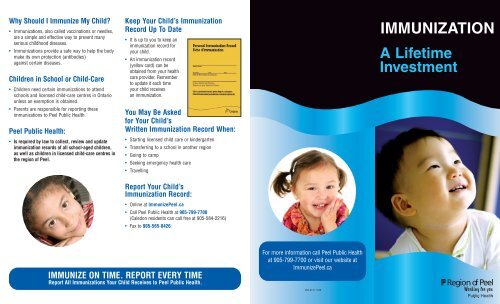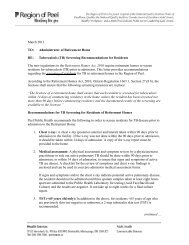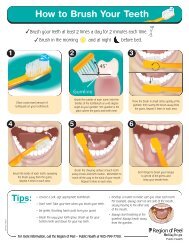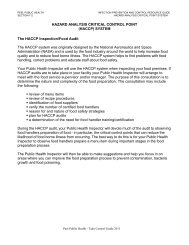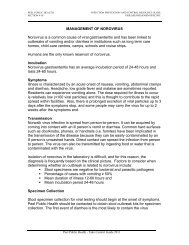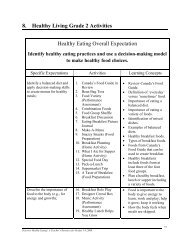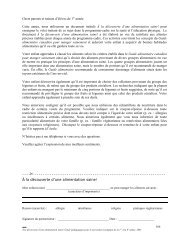General Immunization Brochure-English - Region of Peel
General Immunization Brochure-English - Region of Peel
General Immunization Brochure-English - Region of Peel
You also want an ePaper? Increase the reach of your titles
YUMPU automatically turns print PDFs into web optimized ePapers that Google loves.
Why Should I Immunize My Child<br />
• <strong>Immunization</strong>s, also called vaccinations or needles,<br />
are a simple and effective way to prevent many<br />
serious childhood diseases.<br />
• <strong>Immunization</strong>s provide a safe way to help the body<br />
make its own protection (antibodies)<br />
against certain diseases.<br />
Children in School or Child-Care<br />
• Children need certain immunizations to attend<br />
schools and licensed child-care centres in Ontario<br />
unless an exemption is obtained.<br />
• Parents are responsible for reporting these<br />
immunizations to <strong>Peel</strong> Public Health.<br />
<strong>Peel</strong> Public Health:<br />
• Is required by law to collect, review and update<br />
immunization records <strong>of</strong> all school-aged children,<br />
as well as children in licensed child-care centres in<br />
the region <strong>of</strong> <strong>Peel</strong>.<br />
Keep Your Child’s <strong>Immunization</strong><br />
Record Up To Date<br />
• It is up to you to keep an<br />
immunization record for<br />
your child.<br />
• An immunization record<br />
(yellow card) can be<br />
obtained from your health<br />
care provider. Remember<br />
to update it each time<br />
your child receives<br />
an immunization.<br />
You May Be Asked<br />
for Your Child’s<br />
Written <strong>Immunization</strong> Record When:<br />
• Starting licensed child care or kindergarten<br />
• Transferring to a school in another region<br />
• Going to camp<br />
• Seeking emergency health care<br />
• Travelling<br />
Report Your Child’s<br />
<strong>Immunization</strong> Record:<br />
• Online at Immunize<strong>Peel</strong>.ca<br />
• Call <strong>Peel</strong> Public Health at 905-799-7700<br />
(Caledon residents can call free at 905-584-2216)<br />
• Fax to 905-565-0426<br />
IMMUNIZATION<br />
A Lifetime<br />
Investment<br />
IMMUNIZE ON TIME. REPORT EVERY TIME<br />
Report All <strong>Immunization</strong>s Your Child Receives to <strong>Peel</strong> Public Health.<br />
For more information call <strong>Peel</strong> Public Health<br />
at 905-799-7700 or visit our website at<br />
Immunize<strong>Peel</strong>.ca<br />
CDS-0112 11/09
Is <strong>Immunization</strong> Safe<br />
• Yes, immunization is safe and prevents disease.<br />
• Before any vaccine is approved for<br />
use in Canada, it must go through careful testing to<br />
show it is safe and effective.<br />
When Should I Have My<br />
Child Immunized<br />
• <strong>Immunization</strong> begins in early infancy and<br />
continues throughout life.<br />
• Recommended routine immunizations begin<br />
at 2 months <strong>of</strong> age.<br />
• Visit Immunize<strong>Peel</strong>.ca to view the Publicly Funded<br />
<strong>Immunization</strong> Schedule, which shows when<br />
children can get immunizations free <strong>of</strong> charge.<br />
What Should I Expect After<br />
<strong>Immunization</strong><br />
• The most common side effects are mild and may<br />
include low-grade fever or muscle soreness, swelling<br />
and redness where the vaccine was given.<br />
• Serious side effects are rare.<br />
• The benefits <strong>of</strong> immunization greatly outweigh any<br />
potential risks. Discuss any concerns with your family<br />
doctor or health care pr<strong>of</strong>essional.<br />
<strong>Immunization</strong>s Protect Your Child Against...<br />
Diphtheria is a serious bacterial<br />
disease <strong>of</strong> the nose, throat<br />
and skin. It causes sore<br />
throat, fever and chills and<br />
can also cause breathing<br />
problems, heart failure,<br />
nerve damage, and death.<br />
Pertussis (Whooping Cough) is<br />
a bacteria that causes severe<br />
spells <strong>of</strong> coughing, which may cause<br />
pneumonia (lung infection), convulsions, brain damage<br />
or death, especially in young babies.<br />
Tetanus (Lockjaw) is caused by bacteria that lives in soil<br />
and can infect wounds. It causes muscles <strong>of</strong> the body to go<br />
into painful spasms and can be fatal when muscles in the<br />
chest wall or throat are involved.<br />
Polio is caused by a virus that<br />
destroys nerve cells and can<br />
lead to paralysis, inflammation<br />
<strong>of</strong> the brain and death.<br />
Haemophilus Influenzae Type<br />
B (Hib) is a bacteria that can<br />
infect any part <strong>of</strong> the body. It can<br />
cause serious infections including<br />
meningitis, pneumonia, ear, bone and<br />
joint infections.<br />
Measles (Red Measles) is a virus that causes a generalized<br />
rash, high fever, cough, runny nose, red eyes and white<br />
spots inside <strong>of</strong> the mouth. It can cause diarrhea, ear<br />
infections, pneumonia and inflammation <strong>of</strong> the brain.<br />
Mumps is a virus that causes fever, headache and<br />
painful swelling <strong>of</strong> one or more <strong>of</strong> the glands in the<br />
mouth. Sometimes mumps can be more serious and<br />
cause swelling <strong>of</strong> the brain, temporary or permanent<br />
deafness or swelling <strong>of</strong> the testes/ovaries resulting<br />
in infertility.<br />
Rubella (German Measles) is a virus that causes<br />
low-grade fever, sore throat, mild rash and swelling <strong>of</strong><br />
the glands as well as painful and swollen joints. When<br />
a woman gets rubella during pregnancy, it can cause<br />
miscarriage or severe disability for the baby.<br />
Rotavirus is a common infection that causes vomiting<br />
and diarrhea in infants and children. It is very<br />
contagious and spreads easily if a child is infected.<br />
Most children are infected with rotavirus at least once<br />
by five years <strong>of</strong> age.<br />
Varicella (Chickenpox) is caused by a virus that<br />
causes fluid filled blisters and low-grade fever.<br />
Complications <strong>of</strong> chickenpox can include skin<br />
infections, pneumonia, ear infections, arthritis,<br />
inflammation <strong>of</strong> the brain and in some cases, death.<br />
Pneumococcal Disease<br />
is caused by bacteria that<br />
invade the lungs causing<br />
pneumonia and<br />
infections <strong>of</strong> the ears,<br />
lining <strong>of</strong> the brain<br />
and spinal cord.<br />
It can be fatal in<br />
people with certain<br />
chronic medical<br />
conditions and in the elderly.<br />
Influenza (Flu) is a<br />
serious respiratory<br />
infection<br />
that is caused by the<br />
influenza virus.<br />
It may cause<br />
headache, muscle<br />
pain, high fever,<br />
cough and chills as<br />
well as pneumonia,<br />
middle ear infections,<br />
heart failure or death.<br />
Meningococcal Disease<br />
(Meningitis) is caused by<br />
bacteria that can infect the<br />
blood, brain and spinal cord.<br />
It can also cause deafness,<br />
seizures, brain damage and death.<br />
Hepatitis B is a viral infection <strong>of</strong> the liver that can<br />
cause liver failure, liver cancer and death. Some<br />
people who develop hepatitis B have no symptoms<br />
but can carry and transmit the virus to others.<br />
Human Papillomavirus (HPV) is a viral infection<br />
spread by skin-to-skin contact. Four strains <strong>of</strong> the<br />
virus are responsible for 70% <strong>of</strong> cervical cancers<br />
and 90% <strong>of</strong> genital warts.


